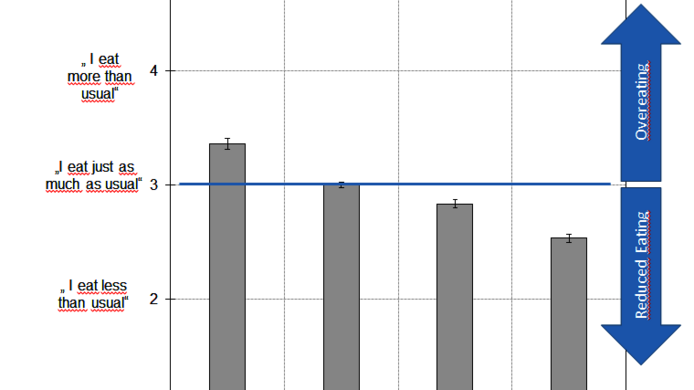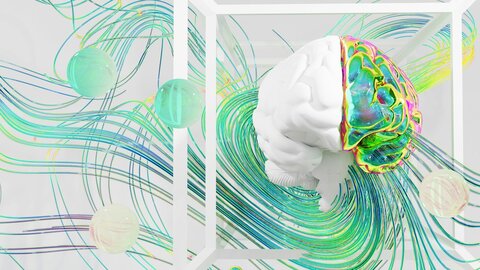Exploring “emo-eating”

We know how it feels to look forward to our favourite dish; we are familiar with the notions of comfort food and feeling butterflies in the stomach instead of hunger. In eating disorders such as anorexia, bulimia or binge eating, food and emotions become entangled in a health-threatening way. Apart from creating problems for the affected individual – from unhealthy diets to excess weight and social isolation – eating disorders are also a massive burden on the public health system.
Snack bars instead of hunting mammoths
The human body was perfectly adapted to life as a hunter-gatherer during the Palaeolithic Age, when food was scarce. Today, that same body exists in a society which offers high-calorie meals within easy reach. Thanks to well-stocked kitchen cabinets, fridges and sandwich bars, snacks are available around the clock. This easy availability challenges our self-restraint. Although it has been established that emotional eating is more often found in overweight individuals, little is known about how regulation processes really work when it comes to food intake. The FWF-funded project Emo Eat conducted at the Department of Psychology, University of Salzburg, intends to explore the connections between mood and unhealthy eating behaviour. In co-operation with the University of Luxembourg, the researchers are currently comparing healthy and bulimic women. The study participants are exclusively women, since they are the gender predominantly affected by eating disorders. In order to work out the commonalities between restrained and emotional eating, the project team uses a combination of learning theories, lab experiments and an eating diary app. “We focus on food intake not driven by hunger. We want to work out the connection between emotions and eating that takes the form of an enhanced appetite for easily available comfort food”, explains principal investigator Jens Blechert in the interview with scilog.
Regulating emotions through eating
The FWF project examines the results of a prior online survey at the University of Salzburg’s Eating Behaviour Laboratory. In response to this survey, the majority of women reported that they ate more than usual when they were sad. The investigation also revealed that the respondents ate less than normal when in a state of anxiety or anger. When happy, they eat the usual amounts. The physiological aspects involved in the interaction between anxiety or aggression have been well researched. The release of the stress hormone cortisol prepares the human body for a flight or fight response. In both situations, the feeling of hunger is suppressed. But what about comfort or frustration eating? Sadness does not entail a threat. Jens Blechert thinks that this case probably involves psychological mechanisms and acquired behaviour. Eating binges are almost always accompanied and triggered by emotions, which is why one well-proven treatment for eating disorders is the analysis of situations that prompt overeating and the search for alternative, healthier ways of self-gratification (social contacts, for instance). By working out the commonalities between healthy and bulimic eaters, the scientist hopes to pave the way for more refined interventions.
Diary app – EEG at the laboratory
The international team in Salzburg and Luxembourg intends to explore comfort eating in a two-stage investigative process. In preparation, healthy study participants are categorised into sub-types: highly emotional eaters, unemotional eaters and a median group. 30 students have already been recruited, but the sample will be extended by 30 more women of different ages, educational and social backgrounds. The first step is a ten-day survey with a digital food and mood diary. “With our Psy-Diary App we give the study participants a practical tool for reporting emotionally charged situations and abnormal eating behaviour”, explains Jens Blechert. The smart-phone app was developed at the University of Salzburg in co-operation with the Salzburg University of Applied Sciences (FH Salzburg). An alarm feature on their smart phones is designed to motivate participants to respond. “It takes only two minutes, which is why 90% of the entries are filed promptly and carefully”, is how the head of the Eating Behaviour Laboratory describes his experience. Based on the data provided by the app, the participants are divided into emotional and non-emotional eaters. The scientists then compare the two groups by measuring electrical activity in the brain: the women are asked to recall negative stressful situations over the past week under controlled conditions. The situations they report most often, by the way, are social interactions, for instance quarrelling with their boyfriend on Skype. The negative stress is often accompanied by sadness. After the mood stimulus, electroencephalography (EEG) records which brain regions are activated in reaction to images of tasty snacks. This enables the researchers to draw conclusions about the mechanisms involved in emotional eating.
Which brain region responds to visual stimuli?
Through this controlled laboratory set-up, the researchers investigate how the images of food are processed while under the impression of a sad memory. Do the snacks get more or less attention? Or do the women repress their attention for fear of losing control? And where in the brain can reactions to the images be measured? “We know that emotion regulation occurs in the frontal lobe. When someone is simply looking at food images we would expect brain activity in the visual cortex or in the reward centre. In case of emotion regulation through eating, we would expect the frontal lobes to direct attention to the images if the mood is negative”, notes Jens Blechert. This would also provide a therapeutic approach: namely shifting attention away to alternatives.
Personal details
Jens Blechert studied psychology at the University of Tübingen and acquired his PhD in Basel on the topic of anxiety disorders. After post-doctoral research in Freiburg, Germany, and Stanford, USA, - he became Assistant Professor at Salzburg University in 2011. As of 2015, he has been a Full Professor of Neuro-Health Psychology and the head of the Eating Behaviour Laboratory.
Publications
Bongers, P.; Jansen, A.: Emotional Eating Is Not What You Think It Is and Emotional Eating Scales Do Not Measure What You Think They Measure, in: Frontiers in Psychology 2016
Blechert, J.; Goltschea, J.E.; Herbert, B.M.; Wilhelm, F.A.: Eat your troubles away: Electrocortical and experiential correlates of food image processing are related to emotional eating style and emotional state, in: Biological Psychology, Vol. 96, 2014
Reichenberger, J., Kuppens, P., Liedlgruber, M. et al.: No haste, more taste: An EMA study of the effects of stress, negative and positive emotions on eating behavior, in: Biological Psychology 2018






